I am running the code below and I am getting different outcome from "some_string".getBytes() depending if I am in Windows or Unix. The issue happens with any string (I tried a very simple ABC and same problem.
See the differences below printed in console.
The code below is well-tested using Java 7. If you copy it entirely it will run.
Additionally, see the difference in Hexadecimal in the two images below. The first two images shows the file created in Windows. You can see the hexadecimal values with ANSI and EBCDIC respectively. The third image, the black one, is from Unix. You can see the hexadecimal (-c option) and the character readable in which I believe it is EBCDIC.
So, my straight question is: why does such code work different since I am just using Java 7 in both case? Should I check any especific property in somewhere? Maybe, Java in Windows get certain default format and in Unix it get another. If so, which property must I check or settup?
Unix Console:
$ ./java -cp /usr/test.jar test.mainframe.read.test.TestGetBytes
H = 76 - L
< wasn't found
Windows Console:
H = 60 - <
H1 = 69 - E
H2 = 79 - O
H3 = 77 - M
H4 = 62 - >
End of Message found
The entire code:
package test.mainframe.read.test;
import java.util.ArrayList;
public class TestGetBytes {
public static void main(String[] args) {
try {
ArrayList ipmMessage = new ArrayList();
ipmMessage.add(newLine());
//Windows Path
writeMessage("C:/temp/test_bytes.ipm", ipmMessage);
reformatFile("C:/temp/test_bytes.ipm");
//Unix Path
//writeMessage("/usr/temp/test_bytes.ipm", ipmMessage);
//reformatFile("/usr/temp/test_bytes.ipm");
} catch (Exception e) {
System.out.println(e.getMessage());
}
}
public static byte[] newLine() {
return "<EOM>".getBytes();
}
public static void writeMessage(String fileName, ArrayList ipmMessage)
throws java.io.FileNotFoundException, java.io.IOException {
java.io.DataOutputStream dos = new java.io.DataOutputStream(
new java.io.FileOutputStream(fileName, true));
for (int i = 0; i < ipmMessage.size(); i++) {
try {
int[] intValues = (int[]) ipmMessage.get(i);
for (int j = 0; j < intValues.length; j++) {
dos.write(intValues[j]);
}
} catch (ClassCastException e) {
byte[] byteValues = (byte[]) ipmMessage.get(i);
dos.write(byteValues);
}
}
dos.flush();
dos.close();
}
// reformat to U1014
public static void reformatFile(String filename)
throws java.io.FileNotFoundException, java.io.IOException {
java.io.FileInputStream fis = new java.io.FileInputStream(filename);
java.io.DataInputStream br = new java.io.DataInputStream(fis);
int h = br.read();
System.out.println("H = " + h + " - " + (char)h);
if ((char) h == '<') {// Check for <EOM>
int h1 = br.read();
System.out.println("H1 = " + h1 + " - " + (char)h1);
int h2 = br.read();
System.out.println("H2 = " + h2 + " - " + (char)h2);
int h3 = br.read();
System.out.println("H3 = " + h3 + " - " + (char)h3);
int h4 = br.read();
System.out.println("H4 = " + h4 + " - " + (char)h4);
if ((char) h1 == 'E' && (char) h2 == 'O' && (char) h3 == 'M'
&& (char) h4 == '>') {
System.out.println("End of Message found");
}
else{
System.out.println("EOM not found but < was found");
}
}
else{
System.out.println("< wasn't found");
}
}
}
